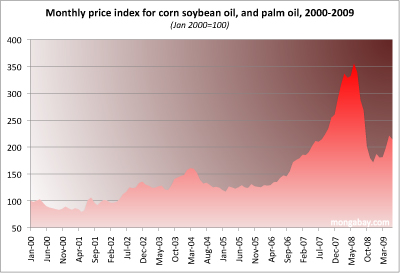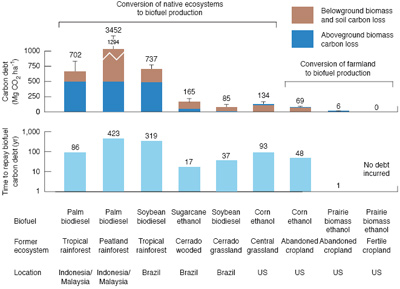|
|
Sustainable biofuels can be a reality but only in combination with reductions in fuel demand and increased productivity on existing agricultural lands, argue researchers writing in the journal Science.
Five years ago biofuels were seen as a panacea for the world’s energy hunger and the need to address climate change, but increased production of biofuels soon contributed to a clutch of problems, including competition with food, resulting in rising prices, and large-scale conversion of rainforests and tropical grasslands for feedstocks, resulting in biodiversity loss and increased greenhouse gas emissions. Environmentalists and scientists condemned many biofuels — including ethanol produced from Midwestern corn ethanol and biodiesel generated from European rapeseed and Southeast Asian palm oil — as a short-sighted energy solution. Some biofuels were found to be even worse for the environment, and more costly, than conventional gasoline.
 Price index including corn, palm oil, and soybean oil for January 2000 through June 2009. Click chart to enlarge. |
However some researchers remain optimistic that smart biofuel production could help meet energy demand without hurting people or the planet. In a Science Policy Forum piece, David Tilman and colleagues explore some of these options, noting that biofuels can be produced in substantial quantities at low environmental cost provided they are derived from feedstocks that have lower greenhouse gas emissions than conventional energy sources and don’t compete with food production. The authors highlight several potential feedstocks, including perennial plants grown on degraded and abandoned agricultural land; crop residues; sustainably harvested wood and forest residues; double crops and mixed cropping systems to maximize production between and during harvest cycles; and municipal and industrial waste.
 Chart modified from Science. Tilman was co-author of a study published in Science in February 2007 that showed the production of some biofuels can result in emissions greater than those from fossil fuels. The analysis looked at the lifecycle emissions from various biofuel feedstocks and presented the results as a “carbon debt” ranking. |
But use of these biomass sources may not emerge on its own, note the authors, who lament that recent biofuels policy dialogue in the United States has become “increasingly polarized” with political influence seeming to trump science.
“The best available science, continually updated, should be used to evaluate the extent to which various biofuels achieve their multiple objectives, and policy should reward achievement,” they write.
To this end, Tilman and colleagues suggest three steps to be taken: “meaningful science-based environmental safeguards should be adopted, a robust biofuels industry should be enabled, and those who have invested in first-generation biofuels should have a viable path forward.”
Such policy should be supported by “rigorous” accounting rules that “measure the impacts of biofuels on the efficiency of the global food system, greenhouse-gas emissions, soil fertility, water quality, and biodiversity. Accounting rules should consider the full life cycle of biofuels production, transformation, and combustion.”
 Oil palm plantations near Lahad Datu, Malaysia. Photo by Rhett A. Butler |
Without such safeguards, “the massive projected increases in global energy and food consumption will greatly elevate atmospheric greenhouse gas levels from fossil fuel combustion, land clearing, and livestock production and will create immense biodiversity loss from habitat destruction and climate change,” the authors warn. “The quality of human life will be compromised.”
David Tilman, Robert Socolow, Jonathan A. Foley, Jason Hill, Eric Larson, Lee Lynd, Stephen Pacala, John Reilly, Tim Searchinger, Chris Somerville, Robert Williams. Beneficial Biofuels—The Food, Energy, and Environment Trilemma. SCIENCE 17 JULY 2009 VOL 325
Related articles
Bioelectricity bests ethanol on two fronts: land use and global warming

(05/07/2009) Yesterday the Obama Administration established a Biofuels Interagency Working Group to oversee implementation of new rules and research regarding biofuels. On the group’s first day of work they would do well to look at a new study in Science Magazine comparing the efficacy of ethanol versus bioelectricity.
80% of agricultural expansion since 1980 came at expense of forests
(02/15/2009) More than half of cropland expansion between 1980 and 2000 occurred at the expense of natural forests, while another 30 percent of occurred in disturbed forests, reported a Stanford University researcher presenting Saturday at the annual meeting of the American Association for the Advancement of Science (AAAS) in Chicago.
Cellulosic ethanol healthier, better for the environment, than corn ethanol

(02/03/2009) Ethanol produced from switchgrass, prairie biomass, and Miscanthus will reduce the environmental and health impacts of expanded biofuels production relative to using corn as a feedstock, report researchers writing in the journal Proceedings of the National Academy of Sciences.
Degraded grasslands better option for palm oil production relative to rainforests, finds study
(12/03/2008) Producing biofuels from oil palm plantations established on degraded grasslands rather than tropical rainforests and peat lands would result in a net removal of carbon from the atmosphere rather than greenhouse gas emissions, report researchers writing in Conservation Biology. The results confirm that benefits to climate from biofuel production depend greatly on the type of land used for feedstocks.
U.S. needs environmental standards for biofuels
(10/02/2008) The U.S. lacks criteria to ensure that cellulosic ethanol production will not harm the environment, warn scientists writing in the journal Science. The researchers say that with proper safeguards, cellulosic ethanol can help the U.S. meet its energy needs sustainably.
Biofuels 200 times more expensive than forest conservation for global warming mitigation
(08/27/2008) The British government should end subsidies for biofuels and instead use the funds to slow destruction of rainforests and tropical peatlands argues a new report issued by a U.K.-based think tank. The study, titled “The Root of the Matter” and published by Policy Exchange, says that “avoided deforestation” would be a more cost-effective way to address climate change, since land use change generates more emissions than the entire global transport sector and offers ancillary benefits including important ecosystem services.
Facing criticism, biofuels industry forms new lobby group to influence lawmakers
(07/25/2008) Under attack by politicians, aid groups, and environmentalists for driving up food prices and fueling destruction of ecologically sensitive habitats, some of the world’s largest agroindustrial firms have formed a lobby group to influence consumers and lawmakers to support continued subsidies for biofuel production, reports Reuters.
Biofuels can reduce emissions, but not when grown in place of rainforests
(07/22/2008) Biofuels meant to help alleviate greenhouse gas emissions may be in fact contributing to climate change when grown on converted tropical forest lands, warns a comprehensive study published earlier this month in the journal Environmental Research Letters. Analyzing the carbon debt for biofuel crops grown in ecosystems around the world, Holly Gibbs and colleagues report that “while expansion of biofuels into productive tropical ecosystems will always lead to net carbon emissions for decades to centuries… [expansion] into degraded or already cultivated land will provide almost immediate carbon savings.” The results suggest that under the right conditions, biofuels could be part of the effort to reduce humanity’s carbon footprint.
Beyond high food prices, little to show for $11B/yr in biofuel support, says OECD report
(07/17/2008) Government support of biofuel production in rich countries is squandering vast amounts of amounts of money while exacerbating the global food crisis and failing to meaningfully curb greenhouse gas emissions and improve energy security, alleges a new report from the OECD, the club of industrialized nations.
Biofuels, food demand may doom tropical forests
(07/14/2008) Rising demand for fuel, food, and wood products will take a heavy toll on tropical forests, warns a new report released by the Rights and Resources Initiative (RRI).
Britain urges ‘cautious approach’ on biofuels
(07/07/2008) Britain and the E.U. should exercise caution in pushing for wider use of biofuels, warns a new study commissioned by the U.K. government.
Louisiana signs non-corn ethanol law to produce a better biofuel
(07/01/2008) Louisiana has signed into law legislation to develop an advanced biofuel industry that excludes corn as a feedstock, reports Biopact.
U.S. may allow corn farming on conservation land
(06/23/2008) The U.S. Department of Agriculture may allow farmers to plant corn on million of acres of conservation land to bolster the food supply in response to flooding in the Midwest and record high prices spurred by demand for domestic ethanol production, according to a report in the New York Times.
Biofuel production on abandoned lands could meet 8% of global energy needs
(06/23/2008) Using abandoned agricultural lands for biofuel production could help meet up to 8 percent of global energy needs without compromising food supplies or diminishing biologically-rich habitats, reports a new study published in the journal Environmental Science and Technology.
Nestle Chairman: Biofuels are “ethically indefensible”
(06/14/2008) The emergence and expansion of biofuels produced from food crops has exacerabted world’s agriculture and water crisis and is a bigger short-term threat than global warming, argued Peter Brabeck-Letmathe in an editorial published Thursday in the Wall Street Journal Asia.
Cellulosic biofuels may be viable alternative to gas within 5 years
(06/02/2008) A new institute in the San Francisco Bay Area is seeking to make cellulosic biofuel an economically viable alternative to corn ethanol and gasoline within the next five years. The Joint BioEnergy Institute (JBEI), a partnership between three national laboratories and three Bay Area universities, was formed in June 2007 after the U.S. Department of Energy awarded the institute a $125 million grant to develop better methods for making liquid biofuels from the natural cellulose in trees and grasses. JBEI researchers expect cellulosic biofuels to yield more energy, produce less greenhouse gases, and have less impact on the environment than other alternatives to gasoline, such as corn ethanol.
Next gen biofuels could decimate rainforests
(05/27/2008) Next generation biofuels could decimate tropical forests says a leading ecologist from the University of Minnesota.
Global ban on biofuels would lead to immediate decline in food prices
(05/16/2008) A global moratorium on biofuels produced from food crops would result in a significant decline in the price of corn, sugar, cassava and wheat by 2010, reports the International Food Policy Research Institute (IFPRI).
Corn ethanol is worsening the Gulf dead zone
(03/10/2008) Proposed legislation that will expand corn-ethanol production in the United States will worsen the growing “dead zone” in the Gulf of Mexico and hurt marine fisheries, report researchers writing in the Proceedings of the National Academy of Sciences (PNAS).
UN: biofuels are starving the poor by driving up food prices
(02/14/2008) Echoing sentiments increasingly expressed by politicians, scientists, and advocates for the poor, the U.N. Food and Agriculture Organization warned that the world’s poorest people are suffering as a result of the push to use food crops for biofuel production.
Biofuels are worsening global warming
(02/07/2008) Converting native ecosystems for production of biofuel feed stocks is worsening the greenhouse gas emissions they are intended to mitigate, reports a pair of studies published in the journal Science. The studies follow a series of reports that have linked ethanol and biodiesel production to increased carbon dioxide emissions, destruction of biodiverse forest and savanna habitats, and water and air pollution.
Switchgrass a better biofuel source than corn
(01/07/2008) Switchgrass yields more than 540 percent more energy than the energy needed to produce and convert it to ethanol, making the grassy weed a far superior source for biofuels than corn ethanol, reports a study published in Proceedings of the National Academy of Sciences (PNAS).
Leading biofuels wreak environmental havoc
(01/03/2008) Biofuels made from world’s dominant energy crops — including corn, soy, and oil palm — may have worse environment impacts than conventional fossil fuels, reports a study published in the journal Science.
Global food prices rise 40% in 2007 to new record
(12/27/2007) As world food prices continue to surge, 37 countries are facing critical food crises due to conflict and disasters, according to a report from the U.N. Food and Agriculture Organization (FAO). FAO’s global food price index rose 40 percent this year to the highest level on record.
U.S. corn subsidies drive Amazon destruction
(12/13/2007) U.S. corn subsidies for ethanol production are contributing to deforestation of the Amazon rainforest, reports a tropical forest scientist writing in this week’s issue of the journal Science.
Guidelines to ensure biofuels production won’t hurt the environment
(08/30/2007) Environmentalists have long seen biofuels as a means to improve the sustainability of transportation and energy use since they are a renewable source of energy that can be replenished on an ongoing basis. Further, because biofuels are generally derived from plants, which absorb carbon from the atmosphere as they grow, biofuel production offers the potential to help offset carbon dioxide emissions and mitigate climate change. Nonetheless, in recent years, there has been considerable backlash against biofuels, which are increasingly viewed as a threat to the environment. Green groups now point to large-scale land conversion for energy crops, higher food prices, and a spate to studies that suggest net emissions from corn ethanol are little better than those from fossil fuels, to caution that biofuels can cause more problems than they address.
Corn ethanol is not the solution to energy independence
(07/18/2007) A new report claims that corn ethanol will not significantly offset U.S. fossil fuel consumption without “unacceptable” environmental and economic consequences.
Miscanthus bests switchgrass as biofuel source
(07/11/2007) In a side-by-side comparison, miscanthus (Miscanthus x giganteus) grass has been shown to be a more productive bioenergy source than switchgrass (Panicum virgatum), according to research presented at the annual meeting of the American Society of Plant Biologists in Chicago.
U.S. ethanol may drive Amazon deforestation

(05/17/2007) Ethanol production in the United States may be contributing to deforestation in the Brazilian rainforest said a leading expert on the Amazon. Dr. Daniel Nepstad of the Woods Hole Research Center said the growing demand for corn ethanol means that more corn and less soy is being planted in the United States. Brazil, the world’s largest producer of soybeans, is more than making up for shortfall, by clearing new land for soy cultivation. While only a fraction of this cultivation currently occurs in the Amazon rainforest, production in neighboring areas like the cerrado grassland helps drive deforestation by displacing small farmers and cattle producers, who then clear rainforest land for subsistence agriculture and pasture.
Ethanol may be greener but have higher health cost
(04/18/2007) Widespread burning of ethanol as fuel may increase the number of respiratory-related deaths and hospitalizations relative to gasoline, according to a new study by Stanford University atmospheric scientist Mark Z. Jacobson. The report comes as mounting environmental concerns cloud the benefits of using ethanol as a green alternative to fossil fuels.
Biofuels could decimate environment, stymie developing countries, says report
(01/25/2007) In his State of the Union Address Tuesday night, U.S. President George W. Bush highlighted ethanol fuel production as a means to improve domestic security by reducing dependence on foreign oil while at the same time helping to fight global warming. His call echoes a broader shift in sentiment among business and political leaders who believe that biofuels — liquid fuels produced ‘energy crops’ including sugarcane, corn, soybeans, oil palms — are a key future liquid energy source. In fact, next week, biofuels are likely to take a prominent position at the European Union’s ‘Sustainable Energy Week’ in Brussels when 650 delegates will listen to speeches by the likes of Al Gore and UK foreign minister Margaret Beckett. With all the enthusiasm it may seem that biofuels are the end-all solution. A new report argues that this is not the case. In its briefing, ‘International trade in biofuels: Good for development? And good for environment?’ the International Institute for Environment and Development (IIED) cautions policymakers not to get caught up in all the hype. IIED warns that serious concerns still remain when it comes to the widespread adoption of these renewable energy sources.
Biomimicry of native prairie yields more bioenergy than corn ethanol
(12/07/2006) Diverse mixtures of plants that mimic the native prairie ecosystem are a better source of biofuels than corn grain ethanol or soybean biodiesel according to a new paper published in the Dec. 8 issue of the journal Science. Led by David Tilman, a biology professor at the University of Minnesota, the research shows that “mixtures of native perennial grasses and other flowering plants provide more usable energy per acre than corn grain ethanol or soybean biodiesel and are far better for the environment,” according to a release from the University of Minnesota.
Switchgrass-based ethanol could cost $1 per gallon, reduce foreign oil dependence
(12/05/2006) Genetic engineering of switchgrass, a native prairie plant, could reduce the price of ethanol to $1 per gallon according to a plant geneticist at the University of Rhode Island.